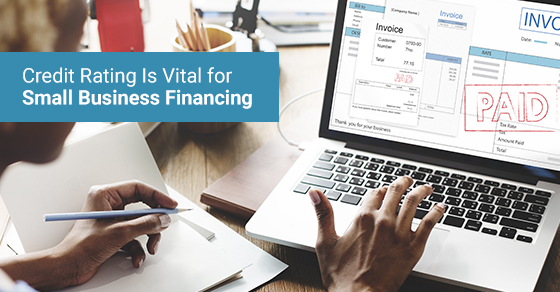The small business market is a highly competitive sector of the economy. Securing a favourable financing arrangement is an important factor in starting the business, and in continually growing the business. One thing your business should aim for is qualifying for an interest rate on the lower end of the spectrum. As well, consider the duration of the financing arrangement and the frequency of payments. Another significant aspect is whether the arrangement allows for intermittent lump sum payments, which can lower the term length of the loan. Whichever financing arrangement you choose, these five points below will help guide you to a better understanding of how credit rating is vital for small business financing.
-
Get funding to grow
During the process of setting up your small business financing, ensure that the total amount covers not only the expenses needed to start the business, but also expenses you are projected to need when it comes time to expand. It’s crucial to include growth funding in the total amount of the financing right at the beginning, because if you ask to extend the financing later on you may be rejected or you may be offered a higher interest rate. Additionally, if you wait until you have enough money of your own to expand, you might have waited too long. It’s important to let your business grow naturally and avoid stifling growth.
According to an SBA survey, 27% of small businesses weren’t able to receive their necessary funding. The survey noted that lack of funding had the biggest impact on the growth of these businesses. Without the required capital to increase their customer base and flourish, the businesses were forced to remain at the same developmental level. Right from the start, such as when drafting your overall business plan, the calculation for the amount of your small business financing must include a portion designated especially for future growth capital. For some businesses, this may involve just one growth spurt, perhaps toward the end of the first year. For other businesses, multiple growth spurts may be projected, in which case the business plan should account for financing these periods. The time to consider all of this is right from the start.
-
Use a business credit card
When you run a small business a credit card is a handy way to cover expenses. However, if you fail to draw a distinction between personal and business expenses, your business credit score becomes wrapped up in your personal credit score. Your personal credit score may be a very favourable number, but combining the two is not a viable way to maintain and improve your business credit score. Your business credit score needs to be developed on its own over time to stand on its own merit.
It’s important to obtain a business credit card for business expenses only. Business expenses should be kept entirely separate from personal expenses. It’s estimated that about $430 billion is spent annually on business credit cards. One in every six dollars spent using general-purpose cards is spent with a business credit card.
-
Be Patient
If your business credit score needs improvement, you may have to wait for a period of 12 to 18 months before you notice significant changes. For most lenders, the only “acceptable” business credit score is a score of 75 or higher. While an unacceptable score does not entirely preclude your business from receiving financing, businesses with lower scores are more likely to be denied loans. The strict guidelines can cause low-scoring businesses to have fewer financing opportunities and limited negotiation power on key aspects such as interest rate.
A 2015 survey of small business owners showed that 46% of small business owners were not even aware that business credit scores exist. In the same vein, 72% of respondents were unsure of how to find information about their business credit score, while a shocking 82% were unaware of how a business credit score should be interpreted.
You should make it a top priority to find out what your business credit score is and do your best to improve it. This is important whether you plan to borrow money or not. Your credit score is the first way people will use to decide whether you’re a safe investment. If you want your business to grow, you need a lender to feel that your business is a stable, worthwhile investment.
-
Consider help from friends or family
The SBA published research showing that about 20% of potential loans are denied to small businesses because of their business credit score. 75% of the funding for small businesses and young firms is directly tied to business credit and bank loans.
At the same time, one in three owners of small businesses has borrowed money from friends and family.This should be considered the last resort for growing a business when the business has been denied a loan. Borrowing from friends and family members can be dangerous, especially if you don’t have an actionable plan to pay the money back. But if you have a poor credit score, this might be your only option.
Many small business owners lack the opportunity to borrow from friends or family. It’s not guaranteed that family members or friends have the financial means to give you a loan. You’ll always be better served by an official financial institution, but you need to have a good credit score to use these avenues. If you do decide to accept a loan from a friend or family member, be sure to draft and sign a detailed loan agreement with terms that you are both comfortable with, to avoid misunderstandings or conflict down the road.
-
Get insights from analytics and data
Studies show that most companies, whether they are small businesses or large corporations, depend largely on their analytics and data to help them with business decisions. Analytics, insights, and data are used to streamline business operations, manage financial risks, improve targeting of the ideal demographic, find high-quality leads, boost individual customer relationships, and grow the business.
In Summary The credit rating of a small business is the lifeline for its finances. Whether for covering daily expenses, purchasing a new line of inventory, hiring staff members, or for conserving your on-hand cash, a quality loan is imperative for starting and growing your business. It’s important to get a head start on building your business credit. The more business credit you amass, the more financial opportunities you’ll be afforded. Keep in mind that banks are not the only financial institutions that rely on business credit to make decisions. Suppliers will also check your credit score to decide whether to begin dealing with you. Further into the relationship, your regular suppliers may again run your credit report at times when you seek to order an increased volume or range of inventory. When you have strong credit, your business has a safety net that allows you access to the funding you require. It’s up to you to build that safety net and secure the financing your business needs to thrive. For more information about how we can help you, call Northwood Mortgage™ at 1-888-492-3690 or contact us here.






































